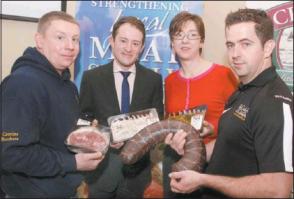By MARIA HERLIHY

A PROJECT to help the local meat supply chain to survive and thrive was launched in Newmarket recently.
The two year project which was launched at IRD Duhallow and its aims is to help small abattoirs, butchers and meat processors across the EU.
THE number of abattoirs across Ireland has fallen in the last two decades from 1,000 to just over 200, and this is a trend which is also repeated across Europe.
However, the ‘Local Meat Supply Chains (SLMSC) project, which is funded by the EU lifelong learning programme, now aims to stem the decline and, importantly, develop an e-learning training programme for small abattoirs, butchers and meat processors throughout Duhallow.
Minister for Research and Development Sean Sherlock officially launched the project and said that supporting the agri food sector is vitally important and will be a major contributor to helping Ireland recover economically.
“It is heartening to see a project addressing some of the challenges faced by the rural meat sector in maintaining profitability and competitiveness,” he said.
Project Co-ordinator at IRD Duhallow Isobel Fletcher said that abattoirs play a key role in the meat supply chain, but yet they have been closing down in the last number of years.
She said that given their rural location, small abattoirs are also faced with the difficulty of retraining and reintegrating staff into the labour market.
“The decline is partly due to external factors such as stringent international legislation, dominance of multinational retailer as well as rising consumer quality demands and scrutiny by environmental and nutritional groups,” said Ms Fletcher.
She told The Corkman that the project has been enthusiastically received by many working in the meat industry.
“They recognise that the future to long term survival depends on developing additional business skills and adding creativity to products and the way in which they do business. The project comes at a time when the industry itself is gearing up for change, she said.
– MARIA HERLIHY
